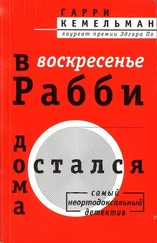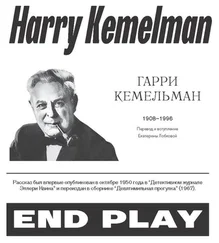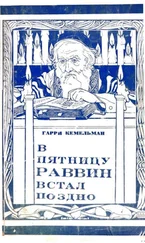Гарри Кемельман - Wednesday the Rabbi got wet
Здесь есть возможность читать онлайн «Гарри Кемельман - Wednesday the Rabbi got wet» весь текст электронной книги совершенно бесплатно (целиком полную версию без сокращений). В некоторых случаях можно слушать аудио, скачать через торрент в формате fb2 и присутствует краткое содержание. Жанр: Классический детектив, на английском языке. Описание произведения, (предисловие) а так же отзывы посетителей доступны на портале библиотеки ЛибКат.
- Название:Wednesday the Rabbi got wet
- Автор:
- Жанр:
- Год:неизвестен
- ISBN:нет данных
- Рейтинг книги:4 / 5. Голосов: 1
-
Избранное:Добавить в избранное
- Отзывы:
-
Ваша оценка:
- 80
- 1
- 2
- 3
- 4
- 5
Wednesday the Rabbi got wet: краткое содержание, описание и аннотация
Предлагаем к чтению аннотацию, описание, краткое содержание или предисловие (зависит от того, что написал сам автор книги «Wednesday the Rabbi got wet»). Если вы не нашли необходимую информацию о книге — напишите в комментариях, мы постараемся отыскать её.
Wednesday the Rabbi got wet — читать онлайн бесплатно полную книгу (весь текст) целиком
Ниже представлен текст книги, разбитый по страницам. Система сохранения места последней прочитанной страницы, позволяет с удобством читать онлайн бесплатно книгу «Wednesday the Rabbi got wet», без необходимости каждый раз заново искать на чём Вы остановились. Поставьте закладку, и сможете в любой момент перейти на страницу, на которой закончили чтение.
Интервал:
Закладка:
"What are you suggesting, David?"
"That it was Safferstein who switched those pills, while he was sitting in his car under the street lamp, before the cruising car came along."
"Just because there was a pill missing?" Lanigan smiled. "You yourself suggested half a dozen ways in which that pill could be missing when I first spoke to you about it."
"True," the rabbi admitted, "but we also have to keep in mind that he had both bottles and time enough to make the switch without fear of being observed."
"But why would he want to hurt the Kestlers? He didn't even know them."
"He didn't?"
"No, and they didn't know him."
The rabbi nodded as he digested this information. "All right, then let's consider all possibilities."
"You going to work some of that whatdoyoucallit— pulpil— on me?" asked Lanigan.
"Pilpul," the rabbi corrected. "Why not? Talmudic pilpul is just logical reasoning that makes use of fine distinctions."
The chief grinned. "Go ahead. I'm in no hurry. It's you folks who seem to be dressed for the evening."
"The Bernsteins are expecting us," Miriam reminded him. "They're having a lot of people over."
"Then we won't be missed," the rabbi answered tartly. "Besides, no one comes on time." He turned to Lanigan. "Let's suppose it was Safferstein."
"Why should we?"
"Why shouldn't we? It's only an assumption, something to start on. Besides, there are the reasons I gave, so it isn't a frivolous assumption."
"All right." Lanigan tossed his coat on the desk, and motioning his visitors to seats, he pulled back his swivel chair. Miriam sat down, but her husband remained standing.
"Let's clear the ground first," the rabbi began. "How?"
"Oh, by eliminating the obvious," said the rabbi breezily. "I mean, that if we assume that Safferstein switched the pills, then it couldn't have been an accident."
"It was you who urged it was an accident originally," Lanigan pointed out smugly.
"But that was when we thought it happened in the drugstore, there, however unlikely, it's possible. But not sitting alone in the car like a small boy who might play with them and then get them in the wrong bottles."
Lanigan grinned. "I guess I can allow that."
"So it was intentional." the rabbi continued, "whether as a joke, or—"
"I can't see how a grown man could possibly consider it a joke to switch medicines on a couple of sick people, one of them his wife."
"Neither can I." said the rabbi. "So it means he did it to hurt someone, and probably not Kestler, since he didn't know him. But that suggests Mrs. Safferstein as the intended victim."
"Not a very good suggestion." said Lanigan. "If it was his wife he wanted to hurt, he would have gone right home and given her one of the pills. But he didn't go home at all, he went to the Kaplan house instead."
"Why?"
"He said because it was storming so hard and he wanted to get in out of the weather."
The rabbi began pacing the floor, his head back and his eyes fixed on the ceiling as the others watched, he stopped suddenly and turned to Lanigan. "Do you know where Kaplan's house is?"
"Of course."
"And Safferstein, do you know where he lives?"
"Certainly."
"Well, I just found out." said the rabbi. "Safferstein's house is no further from Town-Line Drugs than Kaplan's. So if he were bothered about driving in the storm, he could just as easily have driven home."
Lanigan's brow furrowed, and his head made little motions as he followed the two routes in his mind's eye. Finally, he nodded. "You're right, give or take fifty yards."
"So why did he go to the Kaplan house?" "You tell me," said Lanigan.
The rabbi smiled. "It's strange, isn't it? His wife is sick, so he runs out to get her medicine, and then doesn't go home to give it to her. It's what started me thinking of him. Because if he had made the switch, there was no point in going home, he couldn't give her the pills he had with him, since they were Kestler's. Nevertheless, I think he would have gone home anyway and made some excuse for not having the medicine, if only for the sake of appearances."
"Then why didn't he?"
"Because he had to go to Kaplan's, of course."
"There was someone there he had to see?" asked Lanigan. "Kaplan?"
The rabbi shook his head. "No, not Kaplan. Since it was the pills he was concerned with. I suppose it was Dr. Muntz, the man who had prescribed them."
"What would he want with Dr. Muntz?"
"To show him the pills, I presume," said the rabbi quietly.
"But he didn't."
"No, he didn't, that's the irony of the situation, he wasn't able to because he was himself the victim of a switch, he had the pills in his coat pocket, and someone took his coat by mistake."
"But if he had shown them." Lanigan insisted, "then nothing would have happened, the doctor would have spotted the mistake right away, there might even have been time to call the Kestlers, then no one would have got hurt."
"No one? Let's think about it." Once again, Rabbi Small began to pace the floor, his voice lapsing into the singsong chant traditional in Talmudic argumentation. "We assu-ume he had no intention of hurting the Kestlers because he did not know them and had no reason to, a-and no intention of hurting his wife because he did not go home. Bu-ut we know that his intention was malicious. So-o, we must ask ourselves who would be affected even if neither patient took the pills?" He looked at Lanigan expectantly.
"It doesn't make sense, David, a-and," he continued, mimicking the rabbi, "i-if we accept your assumption that he came to Kaplan's house to show the pills to Dr. Muntz, it makes even less sense because what's the point of going to the trouble of switching the pills and then having the doctor switch them back, so to speak?"
The rabbi grinned. "Not bad. You're getting the hang of it, all right, let's see what would happen, here's a room full of people. Safferstein makes some excuse for showing Muntz the pills. 'Those aren't the pills I prescribed,' the good doctor exclaims. 'There's been a mistake made.' Then Safferstein tells him about the other bottle of pills, and Dr. Muntz says, 'They must have switched them somehow. I better call the Kestlers and warn them.' But the point is that kind of thing isn't carried on in whispers, and keep in mind that there's a good chance that Dr. Cohen might be there, too, he'd be consulted, within minutes, everyone in the room would know what had happened, that Town-Line Drugs had made a couple of bad mistakes in filling prescriptions, and no one would be hurt? How about Marcus Aptaker?"
Lanigan nodded slowly. "The druggist down my way said it could drive a man out of business. But what did Safferstein have against Aptaker?"
"I know only that Safferstein had been trying to buy the drugstore," said the rabbi, "and Aptaker wouldn't sell."
Lanigan's eyes opened wide. "What would a big-shot realtor like Bill Safferstein want with a small local drugstore?"
"Ben Goralsky told me the drugstore had a long-term lease, ten years," said the rabbi. "He thought it meant that Safferstein was planning to tear down the building and put something else in its place. But he wouldn't be able to as long as the lease was in effect. What Safferstein was trying to do was drive Marcus Aptaker out of business."
"Damn!" Lanigan muttered. "Safferstein confided in me that he was planning to build a shopping mall there." He nodded. "It all fits."
Miriam, who had been looking from one man to the other like a spectator at a tennis match, now said, "Since you have a case against Safferstein at least as good as the one you have against Arnold Aptaker, I should think you could let the young man go."
Lanigan stared at her for a moment and then got up. Opening the door, he called out to the desk sergeant, "That young fellow you booked earlier— Arnold Aptaker— release him." He returned to his seat. "Of course, I'll talk to Safferstein, but I don't have a particle of proof, he has only to deny it, and then where am I?"
Читать дальшеИнтервал:
Закладка:
Похожие книги на «Wednesday the Rabbi got wet»
Представляем Вашему вниманию похожие книги на «Wednesday the Rabbi got wet» списком для выбора. Мы отобрали схожую по названию и смыслу литературу в надежде предоставить читателям больше вариантов отыскать новые, интересные, ещё непрочитанные произведения.
Обсуждение, отзывы о книге «Wednesday the Rabbi got wet» и просто собственные мнения читателей. Оставьте ваши комментарии, напишите, что Вы думаете о произведении, его смысле или главных героях. Укажите что конкретно понравилось, а что нет, и почему Вы так считаете.










